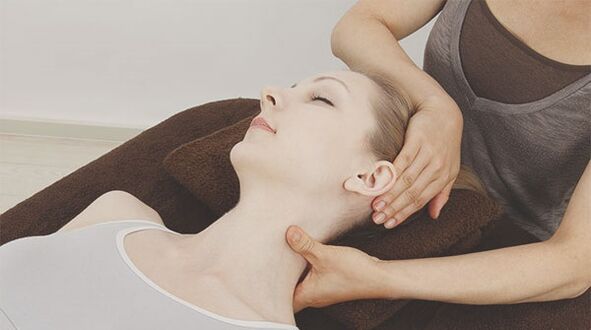Cervical osteochondrosis is one of the most common and frequent diseases of the musculoskeletal system. Everything happens because modern living conditions create the most favorable conditions for the development of this disease. Poor posture in early childhood is considered the main precursor of osteochondrosis of the cervical spine. Most modern professions are associated with prolonged sitting in front of the monitor. People for hours, days and years lead a sedentary lifestyle and, as a result, fall ill with osteochondrosis. How to recognize this disease, what are the symptoms?

Cervical osteochondrosis symptoms
- Pain in the cervical spine. Painful sensations are quite long and aching. The pain usually gets worse when you are lying down.
- If the disease is not treated, the pain becomes so severe and overwhelming that the person becomes incapacitated. Painful sensations practically do not subside, weaken or, on the contrary, become stronger.
- The pain can be accompanied by weakness, dizziness, nausea, and even vomiting. In advanced cases, osteochondrosis can cause loss of consciousness.
- One of the symptoms of the disease is tinnitus and a vibrating sensation. Osteochondrosis also affects blood pressure.
- Tremors in the body and dark circles in front of the eyes are not uncommon with osteochondrosis.
- Sometimes the pain can go to the forearms or hands. Painful sensations turn into tingling and even numbness in the limbs.
How to get rid of cervical osteochondrosis
Osteochondrosis of the cervical spine is a degeneration of the articular cartilage. When the intervertebral discs thin, they affect the nerve endings, which in turn cause the vessels to spasm. The vessels narrow and do not allow the sufficient volume of blood that the brain needs to pass. Oxygen starvation occurs, which leads to serious consequences. Therefore, you shouldn't delay treatment, even if you have minor symptoms. The earlier the treatment begins, the more effective the result will be. To get rid of osteochondrosis, an integrated approach is required. It includes medications, physical education, massage, manual therapy procedures, physiotherapy, and compliance with certain dietary rules.
To get rid of this disease, you need to contact an experienced and professional neuropathologist. The treatment is long enough, it requires discipline and diligence on the part of the patient himself, but this is the only way to get relief and get rid of this obsessive pain.
Drug treatment consists in the appointment of vasodilator drugs. They help oxygenate the brain and improve blood circulation in the body. It is possible to reduce the sensitivity of the nerve endings with the help of non-steroidal anti-inflammatory drugs. In addition, the patient is prescribed vitamins to restore the tissues of the body. Well, and, of course, painkillers, because it is simply impossible to live with such sensations. As a local pain relief, various ointments and gels are prescribed, which have an anti-inflammatory and analgesic nature.
Exercises against osteochondrosis

- Tilt your head back and forth slowly and fully. Leaning forward, try to touch your chest with your chin. Repeat this movement 10 times.
- Make circular movements with your head. First 5 times in one direction, then 5 times in the other.
- Tilt your head slightly forward and rest your forehead against your open palms. Press your head onto your hands and lock in this position for a few seconds. Repeat this exercise with the back of the head.
- Grab a chair and sit on it. Tilt your head back. Slowly turn your head to the right and return to the starting position. Then turn your head to the left. Do at least 10 reps on each side. The movements should not be abrupt, do everything smoothly.
- Tilt your head left and right, trying to reach your shoulder with your ears. Then, on the contrary, raise the shoulders to the immobile head, first together and then alternately, then the right shoulder, then the left.
Massage in the fight against cervical osteochondrosis
A professional massage gives amazing results after the first session. It is best to consult a specialist - chiropractor. He will stretch the muscles and put the vertebrae in order. After the manual therapy sessions, the spinal muscles will tone up, blood circulation will improve and the patient's motor skills will improve.

But to alleviate the condition, you can do the massage yourself at home.
- Sit on a chair or sofa and press your fingers against the nape of the neck along the spine. Rub the area up and down until it feels hot and even burns.
- Do the same in a circular motion. Stretch not only the neck, grab the back of the head to improve blood permeability in this area.
- Use your fingertips to touch the back of the neck.
- There is another effective remedy that doctors recommend. Fill a plastic bottle with water and place it under your neck. Alone or with help, try rolling this bottle with your neck, no hands.
I would like to emphasize that massage and manual therapy procedures cannot be carried out with exacerbations of a painful symptom.
Physiotherapy in the treatment of osteochondrosis consists in the use of a special apparatus that improves the patency of the nerve endings. Electrophoresis is also used.
Prevention of osteochondrosis
To get rid of pain forever, you need to try to change your life for the better. Play sports, go out into nature more often. Get in the habit of running regularly in the morning or walking in the evening. Quitting smoking is also harmful to the discs in the spine. Eat right, eliminate salt from your intake, or at least minimize it.
To get rid of pain attacks, you need to learn not to strain your neck. This means that you cannot read and watch TV while lying down. When driving a car, don't turn your head too far to the side. If your job involves sitting in front of a newspaper or monitor for a long time, take regular breaks: get up, walk, do neck exercises. Pay attention to your workplace. The height of the table and chair should be equal so that you don't have to bend and fold over the papers while sitting.
A properly chosen place to sleep will help you ensure a normal, pain-free life. The bed should be flat and the mattress should be orthopedic. It's important to choose your pillow wisely - it shouldn't be soft. The height of the pillow is determined by the distance from the neck to the shoulder. Only such a pillow will ensure the correct position of the body during sleep.
Osteochondrosis is not a disease that must be treated at home alone. It is very important to classify the disease and exclude other deviations. This can only be done by a doctor. Therefore, when pain appears in the neck area, you cannot pull with a trip to a specialist. And then you can suppress the disease at its root, in its very germ.
























